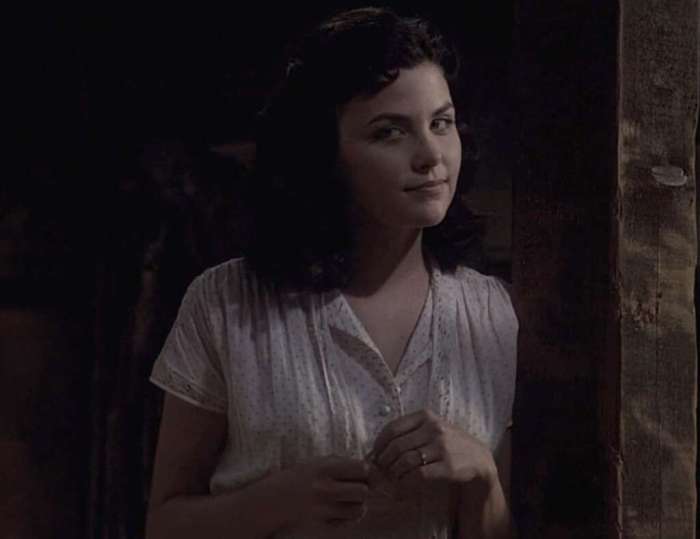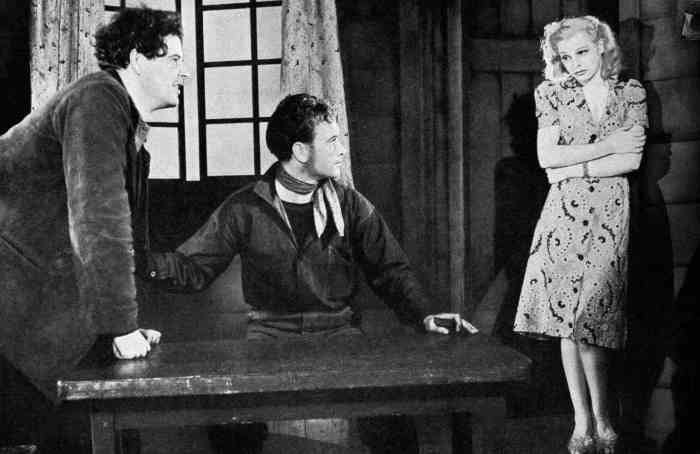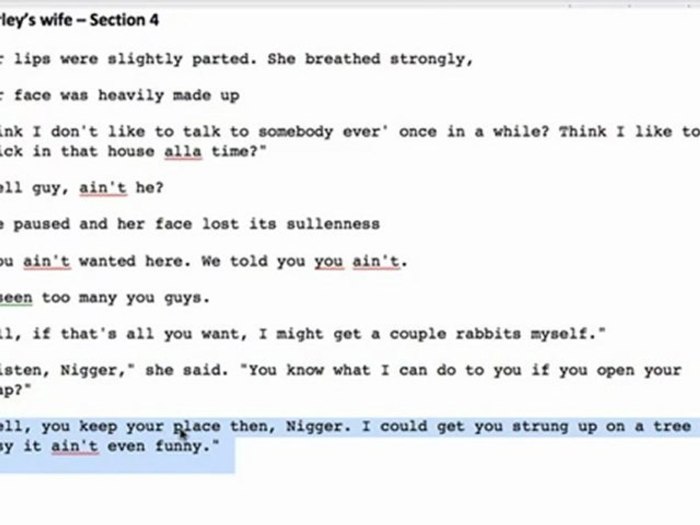Curley quotes of mice and men – Journey into the enigmatic world of Curly’s quotes from John Steinbeck’s “Of Mice and Men.” Through his incisive words, we unravel the complex tapestry of his character, delve into the novel’s symbolic undertones, and witness the dramatic power of language.
Curly’s utterances reverberate throughout the narrative, shaping the plot, illuminating character dynamics, and evoking a profound emotional resonance. His sharp wit, insecurity, and simmering anger find expression in his quotable lines.
Context of Curly’s Quotes: Curley Quotes Of Mice And Men

Curly’s quotes in John Steinbeck’s “Of Mice and Men” provide significant insights into his character and the dynamics of the ranch. They reveal his insecurities, his desire for power, and his complex relationship with his wife.
Curly’s quotes often reflect his insecurities. He is constantly trying to assert his authority over the other ranch hands, but his efforts are often met with resistance or mockery. For example, when he confronts Lennie about talking to his wife, Lennie’s response of “I didn’t do nothing to her” (Steinbeck, 77) enrages Curly and leads to a physical altercation.
Curly’s desire for power is also evident in his quotes. He is constantly trying to prove his worth to the other ranch hands, and he is quick to resort to violence to get what he wants. For example, when he suspects that Lennie has harmed his wife, he immediately goes after Lennie with a gun.
Curly’s relationship with his wife is complex and strained. He is possessive and jealous of her, and he often treats her with contempt. For example, when Lennie asks about his wife, Curly responds with “She’s around” (Steinbeck, 77), a dismissive and impersonal response that suggests he does not value her as a person.
Curly’s quotes are essential to understanding his character and the dynamics of the ranch. They reveal his insecurities, his desire for power, and his complex relationship with his wife.
Curly’s Characterization through Quotes

Curly’s quotes in “Of Mice and Men” offer a window into his personality, motivations, and the themes that shape his character. Through direct and indirect characterization, Steinbeck reveals Curly as a complex and flawed individual driven by insecurity, jealousy, and a need for control.
Direct Characterization
Curly’s direct quotes provide explicit insights into his thoughts and feelings. His frequent use of derogatory language, such as “punk” and “bastard,” reveals his aggressive and confrontational nature. Additionally, his obsession with his wife’s loyalty and his constant surveillance of her suggest his deep-seated insecurity and jealousy.
“If I find you with another man, I’ll stomp your guts out.”- Curly
Indirect Characterization, Curley quotes of mice and men
Steinbeck also uses indirect characterization to develop Curly’s character. Through the observations of other characters, readers gain a broader perspective on Curly’s behavior. For example, George describes Curly as “mean” and “quick with his hands,” highlighting his violent tendencies.
Furthermore, the novel’s setting in the isolated and harsh ranch environment contributes to Curly’s characterization. The constant threat of violence and the lack of opportunities for social interaction intensify his feelings of isolation and insecurity, driving him to assert his dominance over others.
Recurring Themes
Several recurring themes emerge from Curly’s quotes, including:
- Jealousy:Curly’s constant fear of his wife’s infidelity drives his possessive and controlling behavior.
- Insecurity:Curly’s frequent need to prove his masculinity and assert his authority stems from his deep-seated feelings of inadequacy.
- Power and Control:Curly’s aggressive and confrontational nature reflects his desire to maintain control over his surroundings and the people around him.
In conclusion, Curly’s quotes in “Of Mice and Men” provide a rich and nuanced portrayal of his character. Through direct and indirect characterization, Steinbeck reveals Curly’s complex motivations, insecurities, and the recurring themes that shape his behavior.
Symbolism and Metaphor in Curly’s Quotes
Curly’s quotes often employ symbolism and metaphor to convey his feelings and perceptions about the world around him. These literary devices add depth and complexity to his words, enhancing their meaning and impact.
Curley’s sharp and cutting remarks in “Of Mice and Men” reflect his harsh personality. However, his quotes also provide insights into the deeper themes of loneliness and isolation. In the analysis of “Alicia Who Sees Mice,” Alicia’s experiences mirror Curley’s struggles with his own inner turmoil.
Both characters are trapped in their own worlds, unable to connect with others. Curley’s quotes, therefore, serve as a poignant reminder of the human need for connection and the tragic consequences of isolation.
Animalistic Imagery
Curly frequently uses animalistic imagery to describe others, particularly those he perceives as inferior. For example, he refers to Lennie as a “crazy bastard” and a “damn fool,” likening him to a wild and unpredictable animal. This language reflects Curly’s fear and contempt towards Lennie, whom he sees as a threat to his authority and masculinity.
References to Nature
Curly also draws upon references to nature to express his emotions and desires. When he is angry or frustrated, he often resorts to violent language that evokes images of natural disasters. For instance, he threatens to “knock the crap out of” Lennie, comparing his anger to a destructive force of nature.
Symbolic Objects
Certain objects in Curly’s quotes carry symbolic significance. His hat, for example, represents his authority and masculinity. When he takes it off, he is symbolically shedding his power and vulnerability. The ranch itself can be seen as a symbol of the social hierarchy and the power dynamics that Curly seeks to maintain.
Dramatic Impact of Curly’s Quotes

Curly’s quotes play a pivotal role in shaping the novel’s dramatic tension and conflict. His words, often charged with anger and resentment, create an atmosphere of unease and hostility, driving the plot forward.
Curly’s explosive nature is evident in his interactions with George and Lennie. His constant questioning of Lennie’s intelligence and his confrontational attitude towards George escalate the tension between the two men, foreshadowing the tragic events to come.
Key Turning Points
Curly’s quotes serve as turning points in the novel, marking significant shifts in the narrative.
- “So you’re the little guy that’s been giving us so much trouble?”– This quote marks the first encounter between Curly and Lennie, setting the stage for their eventual confrontation.
- “Well, I’ll be damned. So that’s it.”– Curly’s realization that Lennie has killed his wife serves as a pivotal moment, leading to the tragic climax.
Foreshadowing
Curly’s quotes also foreshadow future events, hinting at the tragic fate that awaits the characters.
- “I’ll get that big son-of-a-bitch myself.”– This threat foreshadows Curly’s attempt to kill Lennie, a plan that ultimately ends in his own demise.
- “I’ll show you who’s boss around here.”– Curly’s assertion of authority foreshadows his growing frustration with Lennie and his eventual outburst.
Stylistic Analysis of Curly’s Quotes

Curly’s quotes are characterized by their simplicity and directness. He often uses short, declarative sentences, and his vocabulary is limited to common, everyday words. This reflects his working-class background and his lack of formal education. However, Curly’s quotes are also often laced with anger and resentment, which is revealed through his use of harsh language and insults.
Syntax and Sentence Structure
Curly’s syntax is also relatively simple. He often uses simple subject-verb-object sentences, and he rarely uses complex sentence structures. This reflects his limited education and his focus on the immediate present. However, Curly’s use of short, choppy sentences also contributes to the sense of tension and conflict that permeates the novel.
FAQ Resource
What is the significance of Curly’s quotes in “Of Mice and Men”?
Curly’s quotes provide insights into his character, motivations, and the social dynamics of the ranch.
How do Curly’s quotes contribute to the novel’s symbolism?
Steinbeck uses Curly’s words to explore themes of power, isolation, and the search for belonging.
What literary devices are employed in Curly’s quotes?
Curly’s speech is characterized by vivid imagery, metaphors, and colloquialisms that reflect his personality and background.
